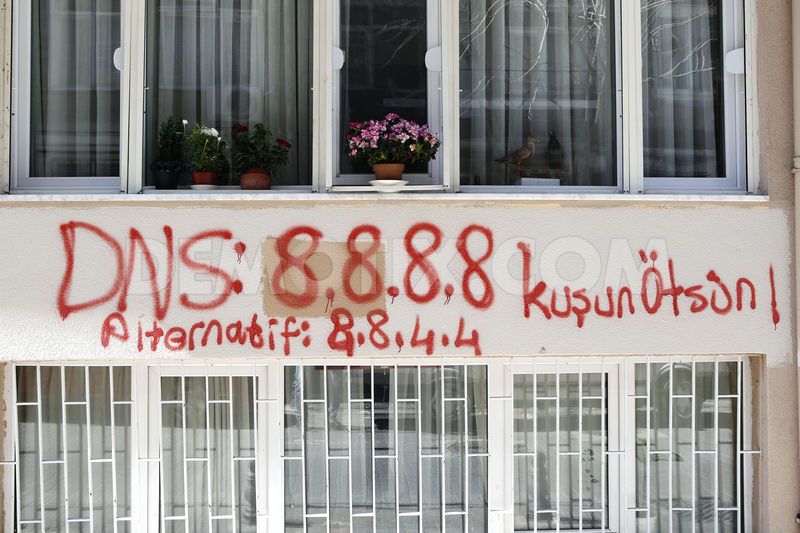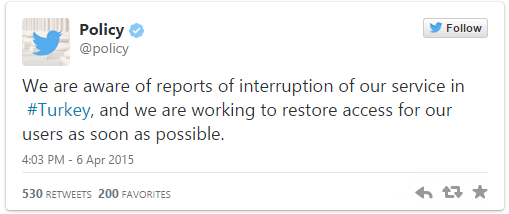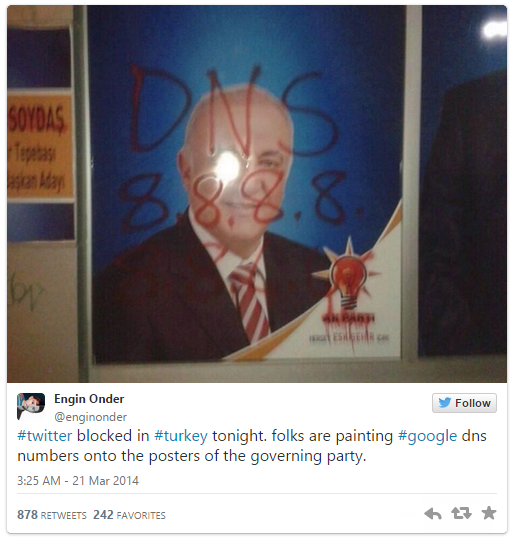Turkey's Latest Social Media Block And How To Bypass It
Today, the Turkish government blocked access to Twitter, Youtube and Facebook, allegedly over the publication of images of a Turkish prosecutor that was taken hostage last week. The blocking also comes two months ahead of the June elections in Turkey, when the 550 members of the Grand National Assembly will be elected. The order was signed by a Republic Prosecutor and is currently being delivered to the various Turkish ISPs.
The new social media block happened about a year after the Turkish government blocked Twitter and YouTube when audio recordings related to prime minister Recep Tayyip Erdogan were circulating on the platforms. A court later ordered the unblocking of the two services.
However, the prime minister has made known that he will try to block them completely in the future. Turkey has tightened up its censorship laws, making it easier for the government to request online services to take down certain content from their pages. Recently, Facebook also had to comply with a court order that demanded it take down a page that allegedly contained content offensive to Prophet Muhammad.
According to sources in Turkey, Facebook has once again agreed to censor the requested material this time, and the ban on the social media site has already been lifted.
Twitter's Policy account posted that its service is currently blocked in Turkey.
It seems that just like last year, the services are being blocked at the DNS level, which means the block can be easily bypassed by changing the DNS settings in the web users' PCs.
The most common DNS addresses last year were Google's 8.8.8.8 and 8.8.4.4 addresses, due to their simplicity. People in Turkey posted them everywhere during the Twitter and YouTube ban, and they even painted them on walls. However, this only lasted a few days, as the government found a way to block the two DNS addresses. This is why it's a little strange that the current order to block three of the largest social media sites can be just as easily bypassed by Google's DNS addresses.
Get Tom's Hardware's best news and in-depth reviews, straight to your inbox.
If the two Google addresses get blocked once again, there are other DNS addresses people in Turkey can use to bypass the block such as the ones from OpenDNS, OpenNIC, BlockAid and other similar DNS services. The more technically literate could even set up their own DNS servers with DNSChain, an anti-censorship and security-focused DNS server software based on blockchain technology.
Another alternative solution people can use is Tor, the browser that can bypass not only censorship but also mass surveillance.
All of these are more or less short term solutions until the government can figure out how to ban all of them in the future. Although it may never succeed completely, it should be possible to make them inaccessible to the vast majority of people. It's also possible that, just like Facebook, Twitter and YouTube will also begin fully complying with all the censorship requests by the Turkish government, which could be almost as bad as a complete ban.
Ultimately, the Turkish citizens may want to start using decentralized alternatives to current centralized social media or video websites, such as GNUSocial (Twitter alternative), MediaGoblin (YouTube/Flickr alternative) and Diaspora (Facebook alternative). All three are federated services, which means multiple people can host the software and content on their servers. To ban certain images or messages, each one of those servers would have to be blocked, which makes a complete ban much harder.
Follow us @tomshardware, on Facebook and on Google+.
Lucian Armasu is a Contributing Writer for Tom's Hardware US. He covers software news and the issues surrounding privacy and security.
-
TNT27 If people actually paid attention to what is happening, and ignore the mainstream media bias and bull, they would also see their own administrative government trying to pass similar things.Reply
And in a democracy (with a republic system here in USA), the citizens hold the power to change, and prevent this, if only they knew it were happening. -
ahnilated ReplyIf people actually paid attention to what is happening, and ignore the mainstream media bias and bull, they would also see their own administrative government trying to pass similar things.
And in a democracy (with a republic system here in USA), the citizens hold the power to change, and prevent this, if only they knew it were happening.
Hah! You really think the people in the USA have any say anymore? You sir, are sadly mistaken. We are in a police state just like everyone else and they are slowly boiling us into line. -
Arabian Knight Hey Tomshardware , stay out of politics , I dont want Foxnews here. I am here for profi Hardware information.Reply -
ahnilated Reply15624177 said:Hey Tomshardware , stay out of politics , I dont want Foxnews here. I am here for profi Hardware information.
If you don't like it you can always click elsewhere. :) -
TNT27 Reply
Simply because most do not even hear, or suspect it. They just go on with their lives buying coffee every morning, hearing news of how bad democrats are, or how bad republicans are. And when facts actually come to them, the bias is strong within, and they continue to vote for idiots.15624088 said:If people actually paid attention to what is happening, and ignore the mainstream media bias and bull, they would also see their own administrative government trying to pass similar things.
And in a democracy (with a republic system here in USA), the citizens hold the power to change, and prevent this, if only they knew it were happening.
Hah! You really think the people in the USA have any say anymore? You sir, are sadly mistaken. We are in a police state just like everyone else and they are slowly boiling us into line.
Obama is no idiot, he is strategically tearing this country's constitution apart.
-
op8 @Arabian KnightReply
How is this anything like Fox News?
Covering something like this is in their purview, its not unusual. -
Engerek01 I am from Turkey and I couldnt be more ashamed of my goverment. They are using things like that as an excuse to ban internet just before elections. They do it all the time. The dictatorship is worse than ever before.Reply
As for bypassing this, Chrome's ZenMate is the easiest and quickest solution. You can also use a VPN service just as mentioned in a few days ago's article. -
NuclearShadow This entire thing is bizarre the unfortunate terrorist event was actually from a left-wing group. While Turkey which was a beacon of secularism in the region is now having a hard right wing lean in recent times. It's so strange to think a terrorist organization could have ideals close to mine yet they are so wrong at the same time. All they achieved is adding ammunition for the government to use and sway public opinions. Violence is never the answer.Reply -
cats_Paw So... It is starting. First Greece chooses a new party, now Turkey gets in trouble with its citizens... Im curious what will be the next Domino to fall.Reply


